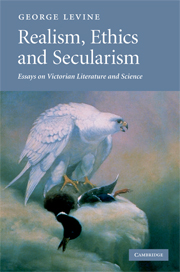Book contents
- Frontmatter
- Contents
- Preface
- Introduction
- Part I THE SUBJECT BROACHED: OTHERNESS, EPISTEMOLOGY, AND ETHICS
- Part II ETHICS WITHOUT GOD, OR, CAN “IS” BECOME “OUGHT”?
- Chapter 2 Is life worth living?
- Chapter 3 Ruskin and Darwin and the matter of matter
- Chapter 4 Scientific discourse as an alternative to faith
- Chapter 5 In defense of Positivism
- Chapter 6 Why science isn't literature: the importance of differences
- Part III LITERATURE, SECULARITY, AND THE QUEST FOR OTHERNESS
- Epilogue
- Index
Chapter 6 - Why science isn't literature: the importance of differences
Published online by Cambridge University Press: 22 September 2009
- Frontmatter
- Contents
- Preface
- Introduction
- Part I THE SUBJECT BROACHED: OTHERNESS, EPISTEMOLOGY, AND ETHICS
- Part II ETHICS WITHOUT GOD, OR, CAN “IS” BECOME “OUGHT”?
- Chapter 2 Is life worth living?
- Chapter 3 Ruskin and Darwin and the matter of matter
- Chapter 4 Scientific discourse as an alternative to faith
- Chapter 5 In defense of Positivism
- Chapter 6 Why science isn't literature: the importance of differences
- Part III LITERATURE, SECULARITY, AND THE QUEST FOR OTHERNESS
- Epilogue
- Index
Summary
The developments in modern literary theory that have produced a radical questioning of the possibility of objectivity, and have turned all written language into discourse, and have insisted on the fictionality of all writing, have also, as a consequence, broken down the borders between fiction and non-fiction. In considering the work and thought of nineteenth-century writers and scientists, it has been necessary to take these critical developments into account and to argue, philosophically and historically, for the importance of the points of view that were held by many Victorian thinkers. In the essays brought together thus far in this book, I have attempted to reconsider the writing and ideas of the Positivists and the scientific naturalists, to see them in relation to their contemporary antagonists and cultural critics. In this essay, which is not directly concerned with the Victorians, I address in terms more recognizably contemporary some of the problems that arise from an extension of the skepticism, already developing among the Victorians, about the possibility of objectivity.
Although the essay is aimed at contemporary forms of the problems, it seems to me appropriately transitional to the essays about Victorian literature that follow in the next section of this book.
- Type
- Chapter
- Information
- Realism, Ethics and SecularismEssays on Victorian Literature and Science, pp. 165 - 182Publisher: Cambridge University PressPrint publication year: 2008



